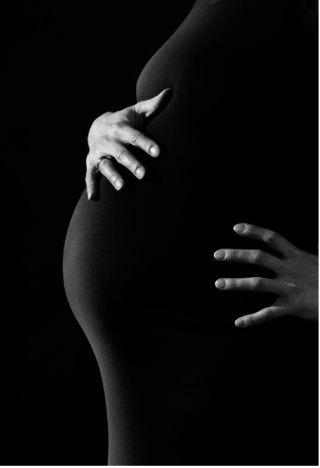Pregnancy
From Joy to Fear: The Alarming Truth About Black Motherhood
It's time to confront the Black maternal mortality crisis head on.
Posted November 1, 2023 Reviewed by Davia Sills
Key points
- Pregnant and mothering Black women are dying of preventable causes due to systemic racism in healthcare.
- The rates of mental health challenges are skyrocketing among Black women transitioning to parenthood.
- We must act now to confront the physical and mental health impacts of the Black maternal mortality crisis.
This post was written by Erica Marshall-Lee, Ph.D., ABPP, and Frances C. Calkins, M.A., on behalf of the Atlanta Behavioral Health Advocates.

I am angry. I am disappointed. I am discouraged. I am confused. Once again, this is nothing new. Why this time, you ask? My instinct is to reply with the sardonic response, “Why not?” because, let’s face it, there is a multitude of reasons that African-descended women in the United States are angry, disappointed, discouraged, and confused.
On this occasion, I am referring to the fact that 11 months ago, my daughter gave birth to two beautiful baby boys. I should have been excited with the anticipation of holding my newest grands, but I wasn’t. I was utterly terrified. I wasn’t worried about her babies. I was worried about my baby. While some might chalk this up to being an overprotective mama bear (which is an identity that I am quite proud of), this is a product of widespread systemic racism exacted against Black and Brown bodies.
You’ve heard the reports, and if you haven’t, allow me to educate you. Instead of experiencing pregnancy and the transition to parenthood as one of the most joyful and exciting times of a woman’s life, it is often one of the most frightening experiences that African-descended women face. The stark reality is that structural racism and personal bias in healthcare lead to a horrifying truth: Black mothers navigating pregnancy and childbirth are disproportionately dying of preventable causes.
For all women, navigating pregnancy and childbirth is a treacherous time, as evidenced by rising maternal morbidity across populations in the United States (Hoyert, 2023):
- 1,205 birthing people died due to maternal causes in the United States in 2021, a rapid increase compared to 754 and 861 deaths in 2019 and 2020, respectively.
- 2021 saw a maternal mortality rate of 32.9 deaths per 100,000 live births, compared to the relatively lower rates in 2020 and 2019 (23.8 and 20.1 deaths per 100,000 live births, respectively).
When it comes to Black individuals, these data are even more troubling.
- The maternal mortality rate for Black women was 69.9 deaths per 100,000 live births in 2021, which is 2.6 times higher than the 26.6 rate for White women (Hoyert, 2023).
- In Georgia, my home state, the maternal mortality rate for Black women is 66.3 deaths per 100,000 live births, compared to 43.2 for White women (SisterLove, 2023).
The chilling truth is that Black women are three times more likely to die from pregnancy-related complications than White women, and Black infants are two times more likely to die before they turn one. These complications include cardiac conditions, excessive bleeding, infections, blood clots, hypertension disorders, and, most prominently, mental health conditions (USAFacts, 2023).
This occurrence is unequivocally the result of discrimination, bias, and racism. This is clearly demonstrated by disparities in the utilization of and engagement with healthcare settings across the U.S. (Epstein, 2023; Hill et al., 2023). Unfortunately, evidence suggests that physicians still hold the belief that Black individuals experience less pain than non-Black individuals (Hoffman et al., 2016). This is a vestige left over from slavery in which slave owners justified the abominable practices involved in the slave industry.
Beyond the greater risk of misdiagnosis of mental and physical health conditions (Epstein, 2023; Fountain House, 2022), as well as under- and untreated medical conditions (Hostetter & Klein, 2021), Black and Brown people are less likely to be believed when reporting medical concerns (Funk, 2022). This ultimately leaves Black families making difficult decisions about if and how to utilize Western medical care during pregnancy and childbirth. To ameliorate risks, many choose to add a doula to their childbirth team to help advocate for safe and humane practices during the birthing process (Kindelan, 2022).
Beyond the physical risks of Black mothering, mental health disorders disproportionately impact pregnant and birthing Black individuals. In fact, Black women are at higher risk of developing perinatal and postnatal mood and anxiety disorders (PMADs) such as depression, anxiety, obsessive-compulsive disorder, and post-traumatic stress disorder. Specifically, over 40 percent of Black women experience postpartum depression, which is more than double the rate of the overall population (Wisner et al., 2013), a statistic that holds up even when controlling for socioeconomic factors, such as income and education level (Hernandez et al., 2022). Though Black women are twice as likely as White women to experience PMADs, they are half as likely to receive care (Kozhimanill et al., 2011; Taylor & Gamble, 2017). Even more concerning is the reality that being a single Black mother increases the likelihood of experiencing depressive symptoms by six times that of the overall population (UPMC HealthBeat, 2020).
This is no doubt due to the barriers Black women face in accessing mental healthcare, some of which include:
- Systemic and interpersonal racism (Sethi, 2020; Parker, 2021; Mathews et al., 2021)
- Distrust of healthcare systems (UPMC HealthBeat, 2020; Parker, 2021)
- Shame and stigma (Kozhimanill et al., 2011; Taylor & Gamble, 2017; Parker, 2021)
- Logistical barriers, such as getting time off work, coordinating childcare, and transportation issues (Kozhimanill et al., 2011; Taylor & Gamble, 2017)
It is imperative that we work to personally and systematically remove these barriers to get Black mothers the care they need.
In sum, we must stand together to put an end to this senseless oppression. We can put an end to the Black maternal mortality crisis. We must decide that we no longer stand for the devaluation of Black and Brown women bringing new life into the world.
Though the reality of this crisis is overwhelming and disheartening, it is vital to take action where possible. Speak up in your workplaces, in your communities, in your homes. Contact your local representatives fighting for and defending reproductive justice. Seek appropriate mental healthcare. Find physicians in your community who are listening to and advocating for Black women and their experiences. Use resources such as the CDC’s Hear Her campaign and Black Mamas Matter to educate yourself and elevate the voices of those working to end this crisis.
Passivity is no longer an option. Our lives, our community, and our futures depend on it.
References
Black Mamas Matter Alliance. (2023). Black Mamas Matter Alliance. https://blackmamasmatter.org/
Centers for Disease Control and Prevention. (2022, November 17). HEAR HER Campaign. National Center for Chronic Disease Prevention and Health Promotion, Division of Reproductive Health. https://www.cdc.gov/hearher/index.html
Epstein, H. M. (2023). Why the color of your skin can affect the quality of your diagnosis. Society to Improve Diagnosis in Medicine. https://www.improvediagnosis.org/dxiq-column/why-the-color-of-your-skin-can-affect-the-quality-of-your-diagnosis/
Foundation House. (2022, February 28). Taking a closer look: Misdiagnosis and racial inequality in mental health care. Foundation House. https://www.fountainhouse.org/news/taking-a-closer-look-misdiagnosis-and-racial-inequality-in-mental-health-care#:~:text=Misdiagnosis%20is%20a%20common%20problem,prevalent%20within%20the%20Black%20community
Funk, C. (2022, April 7). Black Americans’ views about health disparities, experiences with health care. Pew Research Center. https://www.pewresearch.org/science/2022/04/07/black-americans-views-about-health-disparities-experiences-with-health-care/
Hernandez, N. D., Francis, S., Allen, M., Bellamy, E., Sims, O. T., Oh, H., ... & Chandler, R. (2022). Prevalence and predictors of symptoms of Perinatal Mood and anxiety Disorders among a sample of Urban Black Women in the South. Maternal and Child Health Journal, 26(4), 770-777. DOI: 10.1007/s10995-022-03425-2
Hill, L., Ndugga, N., & Artiga, S. (2023, March 15). Key data on health and health care by race and ethnicity. KFF. https://www.kff.org/racial-equity-and-health-policy/report/key-data-on-health-and-health-care-by-race-and-ethnicity/
Hoffman, K. M., Trawalter, S., Axt, J. R., & Oliver, M. N. (2016). Racial bias in pain assessment and treatment recommendations, and false beliefs about biological differences between blacks and whites. Proceedings of the National Academy of Sciences, 113(16), 4296-4301. DOI: 10.1073/pnas.1516047113
Hostetter, M. & Klein, S. (2021, January 14). Understanding and ameliorating medical mistrust among Black Americans. The Commonwealth Fund. https://www.commonwealthfund.org/publications/newsletter-article/2021/jan/medical-mistrust-among-black-americans
Hoyert, D. L. (2023). Maternal mortality rates in the United States, 2021. NCHS Health E-Stats. DOI: 10.15620/cdc:124678
Kindelan, K. (2022, April 11). Black women turn to doulas as maternal mortality crisis deepens. Good Morning America. https://www.goodmorningamerica.com/wellness/story/black-women-turn-doulas-maternal-mortality-crisis-deepens-76896108
Kozhimanill, K. B., Trinacty, C. M., Busch, A. B., Huskamp, H. A., Adams, A. S. (2011). Racial and ethnic disparities in postpartum depression care among low-income women. Psychiatric Services, 62(6), 619-625. DOI: 10.1176/ps.62.6.pss6206_0619
Mathews, K., Morgan, I., Davis, K., Estriplet, T., Perez, S., Crear-Perry, J. A. (2021). Pathways to equitable and antiracist maternal mental health care: Insights from Black women stakeholders. Health Affairs, 40(10), 1597-1604. DOI: 10.1377/hlthaff.2021.00808
Parker, A. (2021). Reframing the narrative: Black maternal mental health and culturally meaningful support for wellness. Infant Mental Health, 42(4), 502-516. doi: 10.1002/imhj.21910
Sethi, S. (2020, April 21). Advancing racial equity in maternal mental health policy. Center for Law and Social Policy (CLASP). https://www.clasp.org/publications/report/brief/advancing-racial-equity-maternal-mental-health-policy/
SisterLove. (2023, March 28). Georgia is the deadliest state for Black mothers – Confronting the reality of Black maternal health. SisterLove. https://www.sisterlove.org/post/black-maternal-health
Taylor, J., & Gamble, C. M. (2017, November 17). Suffering in silence: Mood disorders among pregnant and postpartum women of color. Center for American Progress. https://www.americanprogress.org/article/suffering-in-silence/
UPMC HealthBeat (2020, July 23). Black maternal mental health: The challenges facing Black mothers. UPMC HealthBeat. https://share.upmc.com/2020/07/black-maternal-mental-health/
USAFacts. (2023, May 15). Which states have the highest maternal mortality rates? USAFacts. https://usafacts.org/articles/which-states-have-the-highest-maternal-mortality-rates/
Wisner, K. L., Sit, D. K., McShea, M. C., Rizzo, D. M., Zoretich, R. A., Hughes, C. L., ... & Hanusa, B. H. (2013). Onset timing, thoughts of self-harm, and diagnoses in postpartum women with screen-positive depression findings. JAMA Psychiatry, 70(5), 490-498. DOI: 10.1001/jamapsychiatry.2013.87




